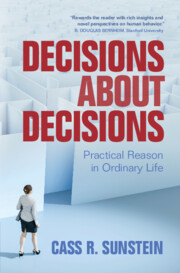Book contents
- Decisions about Decisions
- Decisions about Decisions
- Copyright page
- Contents
- Tables
- Preface
- 1 Second-Order Decisions
- 2 Deciding to Opt
- 3 Deciding to Know
- 4 Deciding to Believe, 1
- 5 Deciding to Believe, 2
- 6 Deciding Inconsistently
- 7 Deciding to Consume, 1
- 8 Deciding to Consume, 2
- 9 Deciding by Algorithm
- 10 Deciding for Oneself
- Epilogue “Get Drunk!”
- Acknowledgments
- Index
9 - Deciding by Algorithm
Published online by Cambridge University Press: 29 June 2023
- Decisions about Decisions
- Decisions about Decisions
- Copyright page
- Contents
- Tables
- Preface
- 1 Second-Order Decisions
- 2 Deciding to Opt
- 3 Deciding to Know
- 4 Deciding to Believe, 1
- 5 Deciding to Believe, 2
- 6 Deciding Inconsistently
- 7 Deciding to Consume, 1
- 8 Deciding to Consume, 2
- 9 Deciding by Algorithm
- 10 Deciding for Oneself
- Epilogue “Get Drunk!”
- Acknowledgments
- Index
Summary
A great deal of theoretical work explores the possibility that algorithms may be biased in one or another respect. But for purposes of law and policy, some of the most important empirical research finds exactly the opposite. In the context of bail decisions, an algorithm designed to predict flight risk does much better than human judges, in large part because the latter place an excessive emphasis on the current offense. Current Offense Bias, as we might call it, is best seen as a cousin of “availability bias,” a well-known source of mistaken probability judgments. The broader lesson is that well-designed algorithms should be able to avoid cognitive biases of many kinds. Existing research on bail decisions also casts a new light on how to think about the risk that algorithms will discriminate on the basis of race (or other factors). Algorithms can easily be designed so as to avoid taking account of race (or other factors). They can also be constrained so as to produce whatever kind of racial balance is sought, and thus to reveal tradeoffs among various social values.
Keywords
- Type
- Chapter
- Information
- Decisions about DecisionsPractical Reason in Ordinary Life, pp. 159 - 180Publisher: Cambridge University PressPrint publication year: 2023



